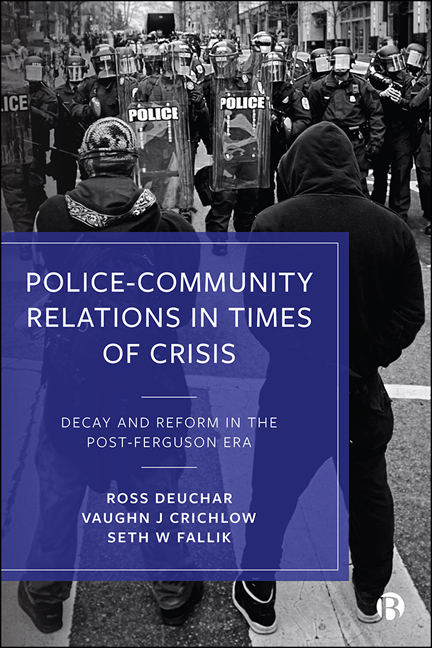7 - The Post-Ferguson Era: The Lived Experiences of Young Men in Racial Minority Communities
Published online by Cambridge University Press: 21 December 2021
Summary
This chapter turns the spotlight away from practitioner perspectives and onto the views of those who are often most affected by law enforcement strategies – young men in communities of color, and specifically those with offending histories. The chapter draws upon insights from semi-structured interviews conducted in a county jail and in local neighborhoods, with young men with criminal histories or those who were on the periphery of criminality. We explore the collective challenges these young men had encountered, including the impact of adverse childhood experiences, social and economic disadvantage, and (where relevant) the influence of gang culture. We also chronicle the young men's lived experiences with racial discrimination from police interventions and the wider criminal justice system. Among the generally despondent narratives shared, we also draw attention to the cautious optimism expressed by some who had recently participated in police-initiated community-engagement programs. In so doing, we draw some conclusions about the young men's juxtaposed exposure to contrasting guardian and warrior police roles, and the continuing and cumulative disadvantage they experienced via law enforcement and – in some cases – the wider criminal justice system.
Moving beyond practitioner perspectives: Interviews with young men
As we described in Chapter 1, this part of the research firstly involved the implementation of semi-structured interviews with eight young racial minority men who were currently residing in the Queen County jail, often awaiting sentencing related to suspected crimes of violence associated with gang culture. Access to the jail was established through a formal application process to the Queen County Sheriff's Office, Department of Corrections, and once this was approved by senior officers, currently incarcerated young men were interviewed. The criteria for selection of the small group of young men was as follows: they had to be residing in the jail for offenses relating to gang-related and/or violent crime; they had to be over the age of 18; they had to be from an ethnic minority group (normally African American or Hispanic), and be willing, through a process of informed consent, to participate in an interview of up to 60 minutes in duration. Senior officers within the Department of Corrections subsequently facilitated meeting times for inmates (aged 22–35) over the course of two full days of fieldwork.
- Type
- Chapter
- Information
- Police-Community Relations in Times of CrisisDecay and Reform in the Post-Ferguson Era, pp. 129 - 152Publisher: Bristol University PressPrint publication year: 2021

